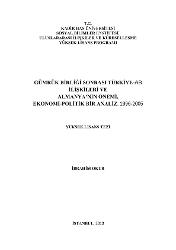| dc.contributor.advisor | Toktaş, Şule | en_US |
| dc.contributor.author | Okur, İbrahim | |
| dc.date.accessioned | 2019-07-12T08:39:31Z | en_US |
| dc.date.available | 2019-07-12T08:39:31Z | en_US |
| dc.date.issued | 2013 | en_US |
| dc.identifier.uri | https://hdl.handle.net/20.500.12469/2336 | |
| dc.description.abstract | Hazırlanan bu çalışma, Gümrük Birliği sonrası Türkiye’nin Avrupa Birliği serüvenini, müzakerelerin başlamasına kadar ayrıntılı bir şekilde anlatmıştır. Bu tez giriş ve sonuç bölümleri haricinde üç ana bölümden oluşmaktadır. Birinci bölümde Gümrük Birliği Anlaşması’nın yürürlüğe konması, bu kapsamda yapılanlar ve sonuçlarıyla birlikte Helsinki Zirvesi’ne kadar olanlar anlatılmıştır. İkinci bölümde, Helsinki Zirvesi’nde üye adaylığı statüsünün kazanılmasından sonra, 2002 Kopenhag Zirvesi’ne kadar karşılıklı yapılanlar, Türkiye’nin üyelik yolunda attığı adımlar ve Almanya’da yaşayan Türklerin ve Alman Başbakan Schröder’in Türkiye’ye destekleri anlatılmıştır. Üçüncü bölümde ise 2002 Kopenhag Zirvesi’nde Türkiye’ye verilen müzakerelere başlama sözünün ardından, Türkiye’nin çalışmaları hızlandırması ve yaptıkları incelenmiştir. Ayrıca, Birliğin Türkiye’nin üyeliği yolunda açıkladığı İlerleme Raporları ve Zirve sonuç bildirgeleri, ve de Türkiye’nin üyeliği için önemi çok büyük olan Kıbrıs konusuna değinilmiş, bu perspektifte sürecin nasıl geçtiği ve sonuçta 2005 yılında müzakerelere nasıl başlandığı aşamaları değerlendirilmiştir. | en_US |
| dc.description.abstract | It has been 50 years since Turkey applied for full membership for EU and it is yet to be accepted. However, Turkey has made significant progress towards full accession after the enforcement of a Customs Union in 1996. In economic and political areas, it has distinguished itself among the EU countries and in international arena. It has strengthened its relations with EU, gained candidate country status at Helsinki in 1999 and furthermore, it has started negotiations to become a full member in 2005. Turkey continues to make an endeavor after the opening of negotiations. In this process, especially Germany and the Turkish-origin population in Germany have become the supporters of Turkey. Turkish-origin population has grown stronger in economic, social and political areas and affected German government positively in Turkey?s case. Germany, as a leading country in EU, promoted Turkey especially under Gerhard Schröder?s rule. Turkey, with its own efforts towards full accession and support from Turkish-origin population and Schröder, has made abovementioned significant progress.In this study, Turkey?s EU accession efforts, from Customs Union to opening of negotiations, are examined in detail. It consists of three main parts. In the first part enforcement of Customs Union with Turkey, of what has been done in this context and Helsinki Summit with its outcomes are analyzed. Second part clarifies the period between the acquisition of candidate country status after Helsinki Summit and Copenhagen Summit in 2002, relations with EU, steps towards full accession and the support of Turkish-origin population in Germany along with German Chancellor Gerhard Schröder and his cabinet. After the promise of opening negotiations with Turkey at Copenhagen in 2002, the acceleration of affairs in Turkey has been worked through, Progress Reports, Final Declarations of Summits and Cyprus issue, which has a significant importance towards full membership and in this context the progress and stages of opening of negotiations in 2005 are evaluated in the third part. Relations with EU have grown stronger through Customs Union and onwards and Turkey gained ground towards accession. Turkey's main aim is to be a full member. | en_US |
| dc.language.iso | tur | en_US |
| dc.publisher | Kadir Has Üniversitesi | en_US |
| dc.rights | info:eu-repo/semantics/openAccess | en_US |
| dc.subject | Türkiye | en_US |
| dc.subject | Avrupa Birliği | en_US |
| dc.subject | Gümrük Birliği | en_US |
| dc.subject | Almanya | en_US |
| dc.subject | Müzakereler | en_US |
| dc.subject | Turkey | en_US |
| dc.subject | European Union | en_US |
| dc.subject | Customs Union | en_US |
| dc.subject | Germany | en_US |
| dc.subject | Negotiations | en_US |
| dc.title | Gümrük birliği sonrası Türkiye-AB ilişkileri ve Almanya'nın önemi, ekonomi-politik bir analiz, 1996-2005 | en_US |
| dc.type | masterThesis | en_US |
| dc.department | Enstitüler, Lisansüstü Eğitim Enstitüsü, Uluslararası İlişkiler ve Küreselleşme Ana Bilim Dalı | en_US |
| dc.relation.publicationcategory | Tez | en_US |
| dc.identifier.yoktezid | 331935 | en_US |
















